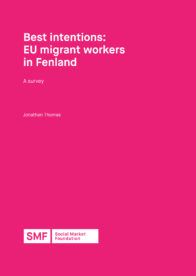This report is based on the results of survey interviews conducted with mostly lower-skilled EU migrants in the Fenland area of the UK, one of the most deprived parts of the UK and at the heart of the "Leave" vote in the EU Referendum. It gauges migrant responses to recent political and immigration policy developments, including awarness of and attitudes towards the EU Settlement Scheme.
- There is no evidence of a Brexodus of lower-skilled EU migrants, who pay relatively little attention to UK politics and policy – major events in UK politics and policy, including Brexit and the 2019 General Election result, appear to have had no significant effect on the decisions of the EU migrants in the Survey about whether to stay in the UK or to leave. Almost four in ten said they intended to stay in the UK for longer than they had planned on arrival. No more than 10% of interviewees said that recent political and policy developments had made it any less likely that they would stay in the UK. Interviewees almost universally said their decisions about staying or leaving were based on financial and family opportunities and concerns. Nearly a third of the group intending to stay said nothing could make them leave.
- Corroboration of how and why official immigration figures have been undercounting some groups of long-term international migrants – 10% of the interviewees said that when they arrived in the UK, they initially intended to stay for less than a year but had subsequently decided to stay for longer. The International Passenger Survey used to count migration into/out of the UK would have classified those migrants as ‘short-term migrants’ based on their initial intention of how long they were going to stay, even though they decided to stay longer and therefore turned out to be ‘long-term migrants’. Undercounting of long-term migrants could be off-set by migrants who arrive intending to stay long-term but who then leave after less than a year. However, the Survey found no interviewees who fit that description, and therefore no such offsetting effect.
- The EU Settlement Scheme is still unknown to many migrants, and poorly understood by users – the Government clearly faces continuing challenges in getting the message out to all EU citizens that they have to apply under the EU Settlement Scheme (EUSS) if they wish to lawfully stay in the UK after the end of the Brexit transition period. Barely half of interviewees were aware of the EUSS. Even among those intending to stay in the UK past the cut off point for applying to the Scheme, over 40% said they were unaware of it. Neither Government communication nor media reporting is a major source of information about the EUSS for the interviewees. Only 7% said they got information about the EUSS from those sources. Most relied on friends (39%), family (20%) and colleagues or employers (18%) for information on immigration rules. The Survey also indicated evidence that many migrants do not fully understand or have awareness of the terms of the EUSS.
- Even a number of longstanding migrants still struggle with English – 5% of interviewees needed interpreter assistance to understand and answer the two-page survey. Among interviewees who had been in the UK the longest, at over 10 years, 75% of them still made use of an interpreter in completing the Survey. The number of migrants needing interpreter assistance to complete the Survey, even after having been working in the UK for some considerable time, suggests that the challenges for the acquisition of English language skills amongst groups of European co-nationals living and working together remain formidable. This may point to the need for greater engagement with employers on this issue, and some form of in-working hours language provision.

Download The Report: PDF
